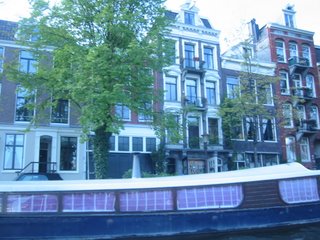
I am on the train back from
We started off talking for about 20 minutes, introducing our background and briefly describing our thesis research and the creation of CDM Select, focusing mostly on the framework for strategic sustainable development, on which the tool is based. Then we had our panel members – Mauricio Mira (our thesis partner and sustainability consultant in Bogota, doing some CDM-related work), Anne Morgan (a student in this year’s class with background in the NGO sector) and Brendan Demelle (a friend who does freelance research on all kinds of social & environmental topics, with a big focus on global warming education & public awareness) – join us and we spent about 40 minutes in a dialogue with the audience.
It was great. Although we essentially packed an hour presentation into 20 minutes, most people seemed to grasp the concepts of the funnel, the importance of understanding the system and having a clear definition of success in the system (the 4 sustainability principles), and the power of backcasting in the context of group decision making and strategic planning. There was a good deal of confusion as well, of course, and some of the expected questions and responses that typically bring the discourse into the “leaves” of detail, confusing the issue, but overall I think people appreciated the broad, high-level, whole-system perspective, and saw how helpful, and indeed vital it is to have some clarity and agreement on that, before diving into the details. Great learning experience for us, and really exhilarating to engage with a live, fresh audience on these ideas and see such a positive response.
The conference itself was dominated by finance and policy types, though there was some NGO presence, energy & technology company reps and project developers. The Prime Minister of the Netherlands opened up the conference, and the main session speakers and panelists were a pretty high-profile bunch – including a former PM of the Netherlands, Chairman of ABN AMRO, execs from Shell and BP, Ministers from China, India, Brazil and Pakistan, and a couple of World Bank execs (and of course the accompanying protestors outside).
On the whole, the conference reinforced for me a lot of the trends I’ve been seeing over the last year: a huge focus on long-term certainty (post-2012 when
The long-term certainty issue is a bit amusing, as I would say there is certainty that there will be an international carbon regime of some kind post-2012, but just not clarity on what it will look like exactly – the policy makers and the private sector were playing ping-pong, both saying they needed the other to really commit (business wants a clear message in the form of a long term framework on what regulations will look like and how quickly they’ll have to de-carbonize, and policy makers say it’s complicated and they need clear signals from business on how aggressive they can be). Regardless, the bottom line is that the EU ETS is an EU directive, which goes on in perpetuity – there’s a chance it could be dissolved, but it wouldn’t be easy, and given the growth, momentum and excitement it has enjoyed I’d say the chances are slim-to-none that it goes away. Credits from CDM projects are accepted in the EU ETS – and it looks like RGGI in the US (which is now likely to link up with California as well) will accept project-based credits – so even without getting total certainty on “Kyoto 2” right now, I don’t think it’s at all crazy to be initiating long-term CDM projects.
There wasn’t a whole lot of talk on the technicalities of the CDM accept to say (as usual) things need to be improved – more talk of “programmatic CDM” (where a program comprised of lots of smaller GHG reductions can generate credits, as opposed to having to be a larger, distinct project – e.g. an efficient lighting initiative across a city) and sector-based CDM. There were calls from non-Annex I (i.e. “developing”) countries for better technology sharing, capacity building and education around CDM. And finally, there were some calling for an increased focus on the sustainable development aspect of CDM projects - we attracted some them to our session, and got some good feedback about the potential for the framework and CDM Select to be helpful in capacity building, designing more appropriate projects and evaluating proposed projects with a whole-system perspective.
All in all it was a great experience at the conference – we learned a lot, met some more great people, and enjoyed some encouraging feedback on our work. The city of Amsterdam was also incredible – beautiful old buildings (many of which are sinking, as most of the city is below sea level – hence their leadership in fighting climate change), great food, and good vibe – the energy of the chaordic bike and trolley traffic balanced by the serenity of the canals and quiet side streets.
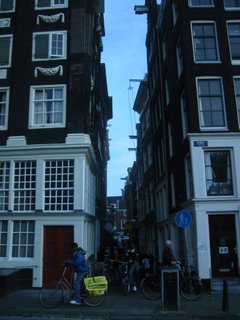
After a few weeks of focusing hard on our BTH project, it was refreshing to check back in with the world of carbon finance and got me really excited about heading to
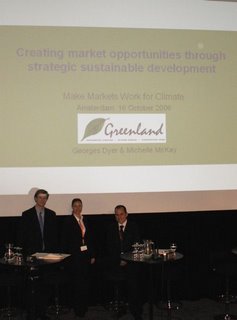
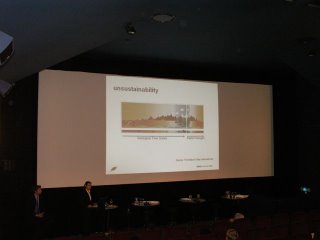
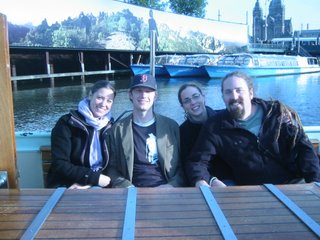

No comments:
Post a Comment